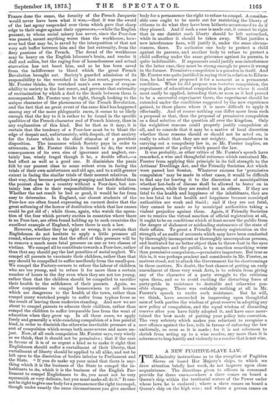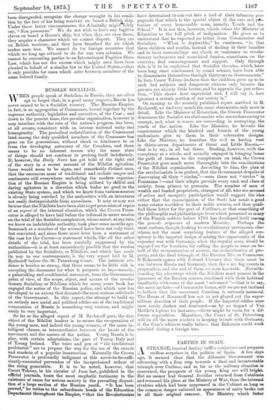A NEW FUGITIVE-SLAVE LAW.
THE Admiralty instructions as to the reception of Fugitive
Slaves on board Her Majesty's ships, to which we drew attention briefly last week, do not improve upon close acquaintance. The directions given to officers in command provide for three cases,—where a slave comes on board a Queen's ship within the territorial waters of the Power under whose laws he is enslaved ; where a slave comes on board a Queen's ship on the high seas ; and where a person comes on board a Queen's ship and claims protection, on the ground that office. A fugitive slave coming on board on the high seas is to be "retained on board, on the ground that on the high seas the British vessel is a part of the dominions of the Queen." This would be a perfectly valid reason for retaining a slave on board a private vessel, because a private vessel is not a part of the Queen's dominions except on the high seas ; but it is an unmeaning reason as applied to a Queen's ship, unless the- Admiralty hold that a Queen's ship ceases to be a part of the Queen's dominions when it enters a foreign harbour. If this is the sense of the instruction, the reason assigned is intel-
he 4iss been detained in a state of slavery on shore, contrary to treaties existing between Great Britain and the country from which he has made his escape. The instructions lay down a "broad rule," by the spirit of which all three eases are to be governed. This rule is that a fugitive slave must not be "permanently received" on board a British ship, "unless his life would be endangered if he were not allowed to come on board." The particular cases are then specifically provided for. When a slave has come on board within the territorial waters of the Power under whose laws he is enslaved, he must not be allowed to remain "after it has been proved to the satisfaction of the officer in command that he is legally a slave." When he has come on board on the high seas, he is to be retained on board, "on the ground that on the high seas the British vessel is a part of the dominions of the Queen ;" but should the ship again come within the territorial waters of the country in which he has been a slave, "he will be liable to be surrendered on demand being made, supported by necessary proofs." When a person claims pro- tection on the ground that he has been detained in slavery contrary to treaty, the commanding officer is to satisfy him- self as to the truth of this statement, and to be guided by the result of his inquiries.
These directions involve a direct contradiction of the general rule of which they are professedly the applications. The rule says that a fugitive slave shall not be "permanently received on board any description of ship under the British flag, unless lis life would be endangered if he were not allowed to come on board." By a slave being "permanently received" is in- tended, if words have any meaning, his being received, and not given up to his owner without his own consent. If he is re- ceived with the purpose of giving him up to his owner at the first opportunity, he is only temporarily received. According to this "broad rule," the question whether a fugitive slave shall be permanently received is made to depend on the ques- tion whether his life will be endangered if he be not received. If his life would be endangered by his not being allowed to come on board, he is to be permanently received. If no danger to life is involved in his not being allowed to come on board, he is not to be permanently received. When we turn to the directions provided for the specific cases, we find that under the first a fugitive slave is not to be per- manently received at all, under the second he is not to be per- manently received if the ship again enters the territorial waters of the country from which he has escaped, and under the third he is not to be permanently received unless the commanding officer shall interpret a particular treaty in a particular way. If the general rule had stoodalone, it would not have been open to the very serious objection to which these instructions are actually open. On the high seas, it may fairly be held that a slave can never be refused admission on board a ship without putting his life in danger. He must have escaped either by swimming from a neighbouring vessel or in a boat from the shore, and in neither case can he safely be left to take his chance on the ocean. And the rule properly implies that if received he is to be "permanently received,"—that is, not to be rendered up to any demands from the ship or shore from which he escaped. But even so, why is not a slave to be received on the high seas who comes solely to gain liberty, and, if that be possible, without any risk to his life ? Why is our rule so ostentatiously to depreciate the desire of gaining liberty and to magnify the desire of saving life ? The case of a slave flying to a British ship while she is within the territorial waters of the country in which he is a slave is obviously surrounded with difficulties. A British ship is only admitted into those waters by the comity of nations, and an indiscriminate reception of fugitive slaves, the setting-up, in fact, of a sort of maritime Cave of Adullam, would be but a poor return for an act which, however common it be, is still only an act of courtesy. It might, perhaps, be contended that there is a sufficient differ- ence, as regards the consequences to the State in whose waters a British ship is lying, between the reception of single slaves and the reception of bodies of slaves, to justify a distinction in the orders made to meet the two cases. But the particular rules are so infinitely more objectionable than the general rule, that we shall not stop to consider whether the latter might not have been framed in a more liberal spirit. The second rule makes by implication an admission so extraordinary, that one is tempted to ask whether some elementary acquaintance with international law ought not in future to be exacted from the First Lord of the Admiralty, as a condition of his taking
board a Queen's ship and claims protection, on the ground that office. A fugitive slave coming on board on the high seas is to be "retained on board, on the ground that on the high seas the British vessel is a part of the dominions of the Queen." This would be a perfectly valid reason for retaining a slave on board a private vessel, because a private vessel is not a part of the Queen's dominions except on the high seas ; but it is an unmeaning reason as applied to a Queen's ship, unless the- Admiralty hold that a Queen's ship ceases to be a part of the Queen's dominions when it enters a foreign harbour. If this is the sense of the instruction, the reason assigned is intel- ligible enough, but what shall be said of a Govenment which deliberately abandons a right claimed and exercised by every maritime power, and volunteers an acknowledgment that a Queen's ship has no international privileges, except such as equally belong to a merchant vessel ? Yet no other explana- tion of the order seems to be consistent with the latter part of it. On the high seas, a Queen's ship is part of the Queen's dominions, and a slave coming on board of such a ship becomes free just as he would become free by landing on British soil. So long as he remains on British soil he will continue free, but if he returns to the country from which he has escaped, he will again become a slave. The Admiralty instructions place a, slave returning on board a Queen's ship to territorial waters of the country from which he has escaped on a level with a slave returning to the actual territory of the country from which he. has escaped. There cannot be a more complete admission that a Queen's ship ceases to be part of the Queen's dominions the moment that it enters the waters of another State.
The same view is borne out by the tenour of the first in- struction. A slave escaping to a Queen's ship lying in a foreign harbour, "must not be allowed to remain on board after it has been proved to the satisfaction of the officer in command that he is legally a slave." But since 1772, at all events, no man is legally a slave on British territory. This.
was determined by all the Judges of the Court of Queen's Bench, at a time when the decision had the effect of setting free some 14,000 or 15,000 negroes living in England as reputed slaves, and thereby inflicting on their owners a possible loss which, at the lowest estimate, was put at £700,000. It is hardly to be sup- posed that the Admiralty mean to treat Lord Mansfield's famous judgment as of no effect, or to recognise the legality of slavery on British soil. Yet they can only escape from this conse- quence by surrendering the British character of a Queen's ship in foreign waters. Give up this, and the Admiralty instruc- tions are consistent with the Somerset case. The ship which contains the fugitive slave has ceased to be a part of British territory by reason of its being in foreign waters. Conse- quently, the freedom which would attach to the slave in virtue of his being on British territory no longer attaches to him. On the other hypothesis, the Admiralty instructions are not consistent with the Somerset case. If a Queen's ship is a part of British territory, and yet a man admitted on board of it is legally a slave, a man can be legally a slave in British territory. The Lords of the Admiralty must make their- choice. They have either set aside a judgment of the Queen's Bench, or they have surrendered the territorial character of public vessels, wherever found. Doubtless they will prefer being self-convicted of ignorance of the rudiments of international
law, to being self-convicted of ignorance of the rudiments of English law. But neither alternative is a dignified one for a great Government department, and if they will accept a friendly suggestion, they will get out of the dilemma by simply cancelling- the instructions.
The text of the general rule laid down by the Admiralty really furnishes commanding officers with sufficient guidance for any contingency that is likely to present itself. There is no law as to receiving or refusing to receive fugitive slaves on board a Queen's ship. Even if the spirit of the restriction that no slave is to be received unless his life would otherwise be in danger is unduly narrow and technical,—which it is, since we do not see why liberty should not be recognised as meaning to many slaves more than life,—the restriction itself does not violate the law of England, and does not put England at a gratuitous disadvantage as regards international law. It is a different matter altogether when an instruction professes to determine the status of a slave who has been received on board a Queen's ship. Just as the Pope, while he retained his temporal dominions, forbade the clandestine baptism of Jewish children, and yet felt himself bound not to give up a Jewish child who had been clandes- tinely baptised, so the Admiralty might, with perfect consist- ency, forbid the reception on board a Queen's ship of a fugitive slave, and yet, supposing that the order had from any cause been disregarded, recognise the change wrought in his condi- tion by the fact of his being received on board a Britisk ship. Under these latter circumstances, the Admiralty raighrfairly say, "Non possumus." We do not wish to have any fugitive slaves on board a Queen's ship, but when they are once there, they acquire a character which we cannot dispute. They are on British territory, and they have breathed the air which makes men free. We cannot do for foreign countries that which we long ago refused to do for our own colonies. We cannot be consenting parties to an International Fugitive Slave Law, which has not the excuse which might once have been pleaded in behalf of a similar law in the United States,—that it only provides for cases which arise between members of the same federal family.
































 Previous page
Previous page